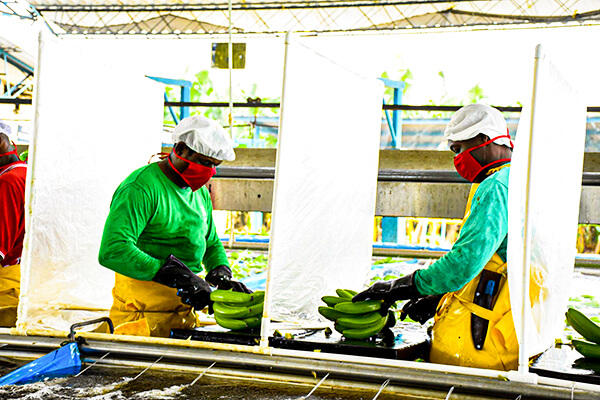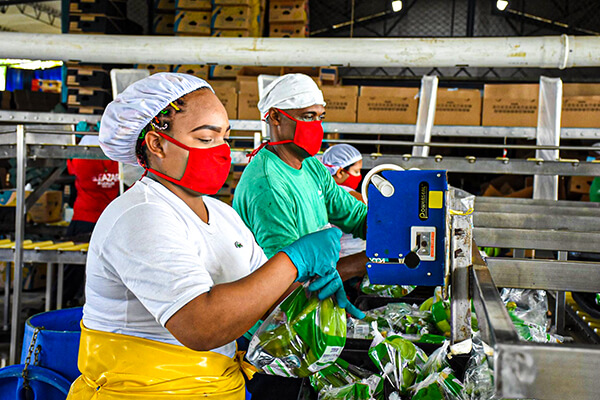Banana Link’s International Coordinator, Alistair Smith, presents an “essential utopia”.
Bananas are not only surviving Covid-19, we are eating more. Some retailers report a 25% increase in sales of what was already their biggest volume product. Consumers in Europe and North America are eating more and more organic bananas, with sales outperforming all predictions.
Plantation and packhouse workers across the Americas and Africa have been deemed ‘essential’ and keep working, sometimes with good protection measures in place, sometimes not. Where workers have had a say through their own independent organisations, measures have been taken in the workplace and during transport to work. Where they are treated as just another factor of production and trade unions are repressed, measures are nonexistent, or at best, inadequate.

The focus on new coronavirus spread has overtaken the focus on soil-borne disease known as Tropical Race 4 (TR4), more deadly for dessert bananas than COVID-19 for humans. Scientists know that the lack of attention to soil health in monoculture banana production can explain the spread of TR4. But just when many are asking whether we will learn the lessons of corona-viral globalisation and look to restart economies without the glaring pre-viral inequalities, it is also fair to ask whether we are learning the lessons of banana monoculture globalisation.
The lessons about biological diversity that scientists are trying to tell us about coronaviruses are the same lessons that are just starting to be heard in the global banana industry. Nobody imagines it will be easy to make the transition to diverse agroecological systems for bananas, but there are signs that the awareness of the need to change is growing as the threat of disease looms larger.
One of the lessons emerging from recent times is that bananas (and plantains) are a vital part of food security, and not just in the band of 70 or so countries around the tropics where they are grown. Imported bananas are also being seen as part of food security in the UK, Germany or the USA.
So, this Earth Day, let’s imagine five or ten years down the road. Let’s assume we agree that a banana system re-set is not only needed but also feasible :
-
We are producing bananas with far less or no synthetic chemicals
-
We are producing and consuming more varieties
-
Bananas are being grown with other crops in the same fields and even livestock
-
Ancient agroforestry systems have been modernised and small farmers are showing the way to the big producers
-
The international industry is sharing its agroecological innovations and new varieties with farmers growing for local markets
-
The focus of certifiers, economists and other analysts is on the territorial impacts of production on human development and natural resources
-
International operators are also selling to local and regional markets (eg feeding big African and Asian cities).
-
Workers and their trade unions are involved in decisions about changes in production systems and assessing their implications for employment.
-
Consumers are paying more for bananas, but know that there are no hidden costs.
We have come along way since we produced a booklet in 1995 entitled “Just Green Bananas?” calling for fair trade and organic bananas and on the industry to take responsibility for the high hidden social and environmental costs.
The next moves by the industry are not easy to make and require a real re-set. But there are enough thought leaders in the right places to mean that the above is not just a utopian vision that will never see the light of day. For the sake of future food security, the shift is achievable.
Photos: Sintrainagro
